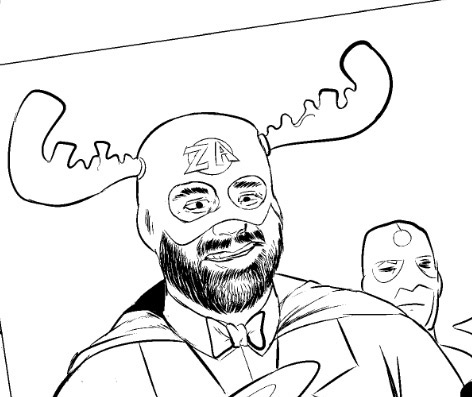 Title: Jonathan Strange & Mr. Norrell: A Novel
Title: Jonathan Strange & Mr. Norrell: A Novel
Author: Susanna Clarke
Publisher: Bloomsbury USA
Genre: Fiction
Available From: Amazon, Barnes & Noble
Jonathan Strange is an odd book. Its premise is simple: it’s the early 19th century and the Napoleonic wars are raging in Europe. England, once the proud seat of European magic and magicians, has all but let that history slip into the past. Magic was once an active art, drawing the finest minds in England to its ins and outs; it has now turned into a passive one, one studied endlessly by gentlemen at their leisure and never, ever put into practice (it’s seen as below their station by most of gentle birth).
An ancient prophecy, one that had been all but written off as a childrens’ fairy tale, foretold a resurgence in English magic in the persons of two mysterious gentlemen: one is to be a bookish, learned type, steady and staid and risk-averse, while the other is to be a natural talent, brash and fiery. You can probably guess where this is going: the two titular characters are indeed the foretold pair. Mr. Norrell arrives on the scene first, having amassed England’s (and most likely the world’s) largest collection of tomes on magic and seeking to run each and every last “magician” from England. Viewing the vast majority of England’s gentlemen magicians as shiftless ne’er-do-wells, Norrell devises a series of wagers that eventually lead almost all magicians to resign their craft in shame.
All, save Jonathan Strange and a few other novices. Strange, a natural adept, initially seeks Norrell’s tutelage and, with Norrell’s help, is eventually deployed to Portugal to assist Lord Wellington with his anti-Napoleonic campaign in the Spanish Peninsula. Upon Strange’s return to England, he and Norrell have a falling out. I’ll leave you to read the rest.
Jonathan Strange is a well-written book, rife with humor and twisting plots. It takes a definite dark turn in its last third and its ending leaves the way open for further books. It’s well worth a read, and even a purchase, particularly now that the trade paperback has hit the streets.
 Title: Assassin
Title: AssassinAuthor: Ted Bell
Publisher: Pocket Star
Genre: Thriller
Available From: Amazon, Barnes & Noble
Let’s get this out in the open, right at the start: Assassin is a ridiculous book, a thoroughly cliched novel in the vein of every Robert Ludlum and Tom Clancy book ever written. It also had me flipping pages to the very end, hoping to discover that A) Ted Bell isn’t the purveyor of some of the most cliched-ridden pap ever written (he’s close) and B) that I was smart enough to outwit him and guess the overarching plot elements and denoument long before Bell’s words led me there (I’d like to think that I had pretty much everything nailed down 75-100 pages in).
The main character, Lord Alexander Hawke, is a direct descendant of the “legendary” British pirate Blackhawke. Born of a British father and American mother, Hawke witnessed their tragic murder at the hands of modern-day pirates at the age of 7 and was taken in and raised by his aging grandfather and kindly butler. Hawke eventually joined the RAF and flew Harrier missions in the first Gulf War, joined the SBS (British version of the SEALs) and, after re-entering private life, dedicated his family’s fortune to helping eradicate evil and international terrorism. If this is sounding like Winston-Churchill-meets-Bruce-Wayne, just wait – it gets better.
Hawke is friends with both the British Prime Minister and the American President, as well as the former lover of the American Secretary of State (a woman named Conchita), all of whom trust him enough to loan him highly-trained personnel from the New Scotland Yard, DSS, CIA, NSA, Navy SEALs, etc., comprising a private army of skilled privateers who make their home on Hawke’s largish yacht. This yacht is equipped with the latest in ship-to-surface cruise missiles and Aegis anti-air technology, capable of months unsupplied at sea and home to Hawke’s self-designed seaplane and host to his 75-year-old parrot “Sniper” that perches on his shoulder and squawks out hoary old pirate cliches and various salty seagoing profanity. Hawke and his band of merry men traipse about the globe, getting into impossible situations and operating outside of all possible laws, all with the implicit-but-never-stated support of the democracies of the West.
Hawke and his fellow travelers have, and I’m not making this up, saved Fidel Castro from an attempted coup by three rebel Cuban generals funded by Colombian drug lords. While in Cuba, Hawke helped to rescue a beautiful American doctor, Victoria, whose saintlike bearing is accentuated by her recent best-selling childrens’ book. Hawke, of course, fell madly in love with the doctor and Assasin opens with Hawke and Victoria’s wedding. All is going well and the ceremony goes without issue, that is until Victoria is gunned down by a sniper’s bullet as she and Hawke exit the wedding chapel.
Hawke is given little time to grieve, though, as American ambassadors have begun dying in highly suspicious fashions worldwide and Hawke and his crew are called in to help the U.S. government track down the perpetrators. The plot is masterminded by, and I’m still not making this up, an Arabic terrorist codenamed “the Dog” who began his career in high yield poaching in Africa and moved subsequently to London real estate, transport of exotic flowers and the international arms trade, all the while dabbling in small-scale homicides to keep his bloodlust up. He is eventually pulled into the employ of a mysterious Emir whose Islamic fundamentalism drives him to attempt to destroy the West and America in particular. The Emir makes the Dog rich beyond his wildest dreams and assists in the construction of (still not making this up) a near-impregnable fortress at 16,000 feet above sea level somewhere on the Asian subcontinent (read: most likely Pakistan or Kashmir), guarded by sophisticated anti-air defenses and manned by a dedicated private army of Islamist troops. The Dog also enjoys the protection of (still 100% serious) four dedicated former sumo wrestlers he personally helped kidnap from their native Japan, which he now employs as bodyguards.
The Dog uses a bevy of beautiful-yet-deadly, highly-skilled female assasins who all take their codenames from various exotic flowers and leave their signature flowers behind at the scene of each of their hits. Each carries out the assasinations of the previously-mentioned American diplomats whose deaths are carefully recorded on video tape and then transmitted back to the Dog for his perverse viewing and pleasure. However, the assasinations are not his primary goal; rather, they serve to disrupt American intelligence networks in advance of a planned mass strike on the American homeland. Plagues, a nuclear holocaust and the utter destruction of America are at stake, should the Dog get his way.
Is your head spinning yet? No? Good.
This book is sheer and utter fluff. It’s a very quick read that only glancingly strikes blows against international terrorism, religious fanatacism, military technology, cloak & dagger black ops and procedural crime dramas while simultaneously using just about every cliche possible in each of those subject matter areas. The dialog is stilted and inauthentic-sounding, the floridly-written sex scenes are mercifully brief, the cursing is bountiful and Bell’s prose is notable for having a character “speak” in one of the worst Ebonics-esque speech patterns I have ever had the displeasure of reading. (From the book’s jacket, Ted Bell looks to be a white male in his late 50’s to early 60’s, so I guess his inability to bring a convincing African American voice to the book isn’t wholly surprising.) It is a cliche of a cliche, stealing the best bits from Clancy, Ludlum, Koontz, et al. and then poorly implementing said bits. It’s almost the literary equivalent of a bizarre fusion of CBS’s “hits” NCIS and The Unit.
In other words, it’s so bad, it’s almost good. It could, quite possibly, be the single best trashy summer novel in years.
 Title: Penny Arcde Volume 2: Epic Legends of the Magic Sword Kings
Title: Penny Arcde Volume 2: Epic Legends of the Magic Sword KingsAuthors: Jerry Holkins and Mike Krahulik
Publisher: Dark Horse
Genre: Webcomic compendium
Available From: Amazon, Barnes & Noble
Penny Arcade: Volume 2 is upon us and, as was the case with their previous effort, Krahulik and Holkins have succeeded in bringing their fare into an “offline, wireless” tome that is well worth buying. While Vol. 1 covered the first ~2.5 years (1998-2000) of Penny Arcade‘s existence, Vol. 2 covers only a single year (2001). Since their output over the course of a single year is obviously far less than that of the previous two-and-a-half, Tycho and Gabe both contributed to a certain amount of “padding”. Tycho contributes several newsposts, which are interspersed among the comics themselves, while Gabe contributes artwork from the Penny Arcade collectible card game to the back of the book. Additionally, several abandoned Penny Arcade projects (including one Cardboard Tube Samurai story arc and the Over Easy miniseries that Club PA members had access to) are presented in the “Boneyard” section of the book, giving a glimpse into the creative ideas the pair have tossed aside over the years.
The lower number of comics in Vol. 2 is definitely a bit of a disappointment, but the additional bonus content makes this compendium feel a bit more like a “director’s cut” of the year 2001’s comics. The print quality and colors are still of the highest order and I’ve really been impressed with the effort the PA guys obviously put into these first two books. I’d rate this another “definite buy” for Penny Arcade fans. Here’s to hoping Volume 3: The Warsun Prophecies ends up being just as good.



